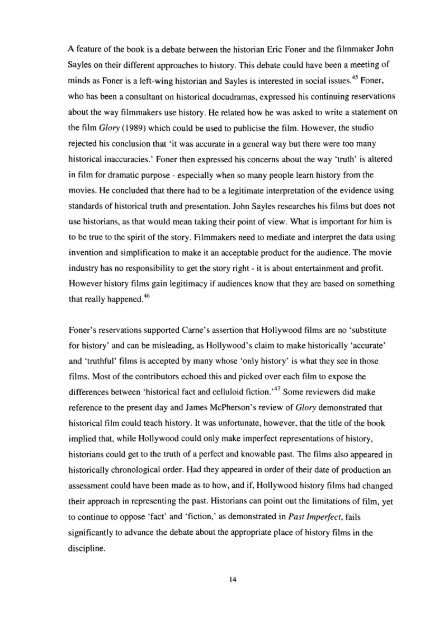Download (3483kB) - Greenwich Academic Literature Archive ...
Download (3483kB) - Greenwich Academic Literature Archive ...
Download (3483kB) - Greenwich Academic Literature Archive ...
- No tags were found...
You also want an ePaper? Increase the reach of your titles
YUMPU automatically turns print PDFs into web optimized ePapers that Google loves.
A feature of the book is a debate between the historian Eric Foner and the fllmmaker JohnSayles on their different approaches to history. This debate could have been a meeting ofminds as Foner is a left-wing historian and Sayles is interested in social issues. Foner,who has been a consultant on historical docudramas, expressed his continuing reservationsabout the way filmmakers use history. He related how he was asked to write a statement onthe film Glory (1989) which could be used to publicise the film. However, the studiorejected his conclusion that 'it was accurate in a general way but there were too manyhistorical inaccuracies.' Foner then expressed his concerns about the way 'truth' is alteredin film for dramatic purpose - especially when so many people learn history from themovies. He concluded that there had to be a legitimate interpretation of the evidence usingstandards of historical truth and presentation. John Sayles researches his films but does notuse historians, as that would mean taking their point of view. What is important for him isto be true to the spirit of the story. Filmmakers need to mediate and interpret the data usinginvention and simplification to make it an acceptable product for the audience. The movieindustry has no responsibility to get the story right - it is about entertainment and profit.However history films gain legitimacy if audiences know that they are based on somethingthat really happened. 46Foner's reservations supported Game's assertion that Hollywood films are no 'substitutefor history' and can be misleading, as Hollywood's claim to make historically 'accurate'and 'truthful' films is accepted by many whose 'only history' is what they see in thosefilms. Most of the contributors echoed this and picked over each film to expose thedifferences between 'historical fact and celluloid fiction.' 47 Some reviewers did makereference to the present day and James McPherson's review of Glory demonstrated thathistorical film could teach history. It was unfortunate, however, that the title of the bookimplied that, while Hollywood could only make imperfect representations of history,historians could get to the truth of a perfect and knowable past. The films also appeared inhistorically chronological order. Had they appeared in order of their date of production anassessment could have been made as to how, and if, Hollywood history films had changedtheir approach in representing the past. Historians can point out the limitations of film, yetto continue to oppose 'fact' and 'fiction,' as demonstrated in Past Imperfect, failssignificantly to advance the debate about the appropriate place of history films in thediscipline.14
















